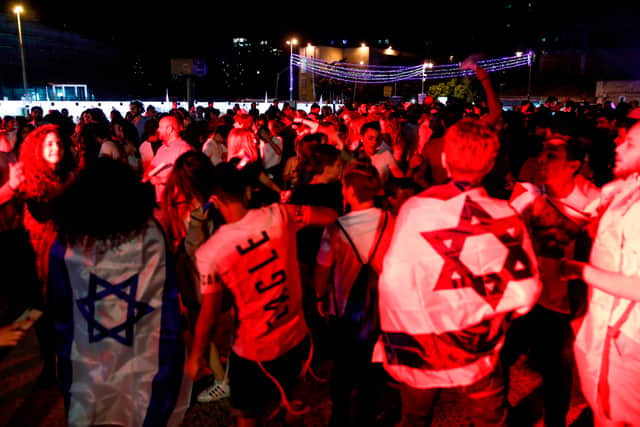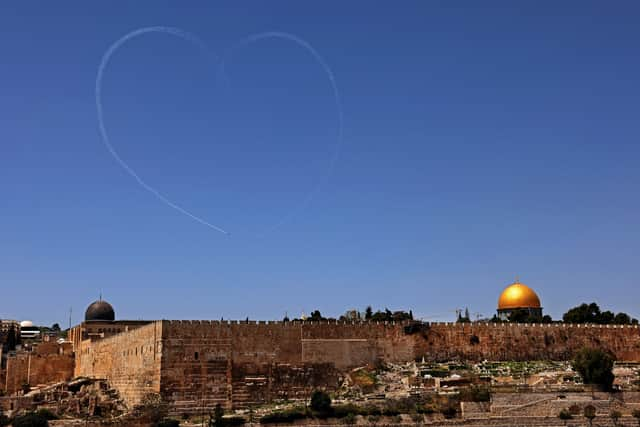Yom HaAtzmaut: when is Israeli Independence Day, and how do Jewish people celebrate it?
and live on Freeview channel 276
Yom HaAtzmaut, which is Hebrew for ‘Day of Independence’ is the national day of Israel and commemorates the Israeli Declaration of Independence in 1948.
The declaration was proclaimed by David Ben-Gurion, the Executive Head of the World Zionist Organization, Chairman of the Jewish Agency for Palestine, and the first Prime Minister of Israel.
But when is Yom HaAtzmaut in 2022 and how is it celebrated?
Here’s what you need to know.
Advertisement
Hide AdAdvertisement
Hide Ad

When is Yom HaAtzmaut 2022?
Israel initially declared independence on 14 May 1948 from the Palestinian mandate after the Arab-Israeli War, which in the Hebrew calendar, corresponded with 5 Iyar.
However, as members of the Jewish faith refrain from working on the Sabbath, sometimes the date of the celebration is moved to avoid Sabbath desecration.
However, as the Independence Day is rarely celebrated on 5 iyar itself, as the days move backwards or forwards depending on the Sabbath, the independence day can fall anywhere between the 3 and 6 of Iyar.
This year, in 2022, Yom HaAtzmaut will commence at sunset on 4 May until sunset on 5 May, as the Hebrew calendar is lunar based and is moveable, unlike the Gregorian calendar.
Advertisement
Hide AdAdvertisement
Hide AdAlthough in the Gregorian calendar, Yom HaAtzmaut is on 14 May, Israel celebrates it according to the Hebrew calendar and therefore Yom HaAtzmaut can fall anywhere in late April to mid-May.
How is Yom HaAtzmaut celebrated?
Yom HaZikaron is a memorial day for the fallen soldiers of the wars of Israel, and always takes place a day before Yom HaAtzmaut.
This observance also needs to be accounted for to avoid Sabbath desecration.
As Yom HaZikaron ends at sunset, the celebration of Yom HaAtzmaut begins with an official ceremony on Mount Herzl in Jerusalem.
Advertisement
Hide AdAdvertisement
Hide AdThe ceremony includes speeches from the speaker of the Knesset (the Israeli Parliament), ceremonial lighting of the twelve torches to represent the Tribes of Israel, and arctic performances.
As this is a celebration, fireworks are lit, and streets around the squares are closed to allow people to sing and dance and rejoice in the streets.
On the independence day itself, the President of Israel honours Excellence in 120 Israeli soldiers. During the years 1948 to 1973, parades in the soldiers’ honour were held.
In 1951, the Israeli Independence Day was given the status of a minor Jewish holiday and a Jewish prayer, Hallel, was to be recited.
Advertisement
Hide AdAdvertisement
Hide AdMany people spend this day eating authentic Israeli food such as Hummus and Baba Ghanoush.


How is Yom HaAtzmaut observed for Israeli-Arabs?
For some Israeli Arabs, the day is regarded as tragic and is known as Nakba, which transalates to “the catastrophe”. This day is commemorated on 15 May.
Nakba is observed because the Israeli-Arab war also saw the destruction of the Palestinian homeland and their society, which caused a permanent displacement of many Palestinian Arabs.
The term is now also used to describe the ongoing occupation of Palestine in the West Bank and the Gaza Strip.
Advertisement
Hide AdAdvertisement
Hide AdIn 2011, the Knesset approved a change in the budget and authorised the Ministry of Finance to reduce government funding to any non-governmental organisation (NGO) that organises a Nakba commemoration event, and impose penalties on any organisation commemorating Yom HaAtzmaut as a day of mourning.
The Supreme Court of Israel rejected any appeals of the Nakba Law on 5 January 2012.
Comment Guidelines
National World encourages reader discussion on our stories. User feedback, insights and back-and-forth exchanges add a rich layer of context to reporting. Please review our Community Guidelines before commenting.
